Like the World Cup Doonhamers feature, this article was orignially published in June 2010 during the World Cup when qosfc.com was with a different website hosting company.
Ally MacLeod spent part of his boyhood growing up in Mount Florida . He signed for one of the two sides whose grounds backed on to each other in that part of Glasgow, Third Lanark. The days when he was destined to be more associated with the ground of the other, Hampden Park, were still decades away. He studied for his Highers and in the early part of his playing career also worked as an industrial chemist.
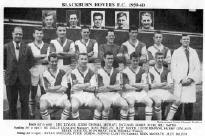
The highlight of his playing career was during his time at Blackburn Rovers. He was part of the side that won promotion to England’s top division and then was selected for the 1960 F.A. Cup Final. The game hinged on a few minutes just before half time. Wolves took the lead in the 41st minute with a goal deflected off a Rovers defender. It got worse for Blackburn two minutes later. Defender Dave Whelan (yes, he who now owns Wigan Athletic) broke his leg in an innocuous looking challenge.
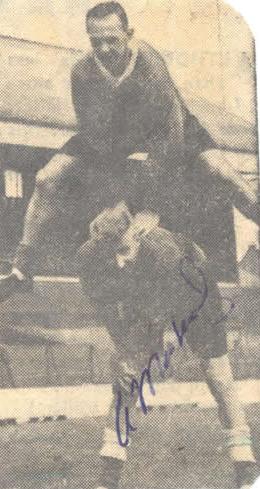
(MacLeod training in his Blackburn days)
In the era before subs, Wolves must have felt the trophy was theirs. Rover’s had other ideas and weren’t prepared to go down without a fight. MacLeod, a long striding left winger who scored 47 goals in 193 Rovers league games, ended up collecting the man of the match award. This, though, wasn’t enough to turn the game around and Wolves ran out 3-0 winners.
MacLeod ended his playing days at Ayr United and it was there that he held his first managerial position. He turned the previously modest Somerset club into a much respected side after winning promotion to the top division. They finished one point away from a European spot. Runs were achieved to each of the Scottish and League Cup semi finals, taking Celtic to a replay in the latter. After securing a position in the inaugural Scottish Premier Division, he moved to Aberdeen. A League Cup Final success over Celtic added to a 5-1 thumping of Rangers led to the position where MacLeod will always be best remembered, manager of the Scotland national team. He was appointed in May 1977.
His first game in charge was a 0-0 draw against Wales in Wrexham and was followed up with a 3-0 win over Northern Ireland. The last game of that year’s British Championship was, as usual, against England. The Scots had won two of the previous three encounters between the Auld Enemy, but had not won at Wembley since the 3-2 game in 1967 when Jim Baxter played ‘keepie uppie’. With Scots piled into London in their hoards, the cacophony from the Tartan Army gave Wembley the atmosphere of a home game for the team in dark blue. Lined up side by side in the tunnel pre kick off, Gordon McQueen turned to England’s Mick Mills and said, “Millsy, can you smell the whiskey”?
McQueen himself opened the scoring for Scotland with a header just before half time. Kenny Dalglish got the better of Ray Clemence for the second year running in scoring the Scots second goal (Robert Green could do worse than look at Dalglish’s 1976 goal to assure himself that his nightmare moment against USA was by no means the first such howler by an England keeper). Mike Channon scored a late penalty for a final score of 2-1 that on this occasion flattered England. The euphoric Scotland fans decided to return home with the Wembley turf, and in a different slant on the term ‘cross bar challenge’, also returned home with the woodwork. In the eyes of Scotland fans, MacLeod was doing very nicely.
Next was a three game tour to South America, sensible preparation ahead of the World Cup Finals scheduled for there the following year. Chile were beaten 4-2 before playing against scheduled World Cup hosts, Argentina. The Scots earned a 1-1 draw including two particular points of note for the Scots, Don Masson’s penalty goal (matched with a penalty score by Daniel Passarella) and the sending off of Willie Johnston. Argentina striker Leopoldo Luque said to Johnston after the game, "Johnston, you are a very good player, but do not return to Argentina for the World Cup. Things will not be nice for you."
The last game of the tour was at the Maracana in Rio. The scores were level until the last 20 minutes when Zico and Rivelino scored to make it a 2-0 win for Brazil.
And so to the business of World Cup qualification. MacLeod had taken over mid campaign in a 3 team group that contained Wales and the reigning European Champions, Czechoslovakia. The Czechoslovaks had beaten the Scots 2-0 in Prague. The opening Czech goal was by Antonin Panenka (it was his nerveless clinching penalty clip down the middle in the Euro final shoot out against West Germany that led to such a penalty being informally named, ‘a Panenka’). Wales had been beaten 1-0 at Hampden with an own goal enough to separate the sides. MacLeod’s first game of the competition was the Czechoslovak visit to Hampden. Despite the then lofty status of the visitors, the Scots at least had some psychological redress in having beaten them 2-1 four years before at Hampden to clinch a place at the 1974 World Cup. MacLeod went one better with goals by Joe Jordan, Asa Hartford and Kenny Dalglish against a single late goal in reply. And so it was all to play for in the Wales v Scotland game.
Ninian Park at the time had too limited a capacity for the Welsh FA head honchos, myopically smelling a big pay day in the face of the inevitable tartan invasion for such a crucial fixture. They elected to swap the game to Anfield. Why they could not switch instead to rugby’s Arms Park in Cardiff, the Welsh authorities could maybe explain. Predictably the Scotland fans turned the Liverpool ground into a raucous pro Caledonian cauldron. The game hinged on a refereeing decision when a second half ball into the Welsh box was punched on by Jordan. The ref had earlier made an error of judgement in denying Dalglish a penalty when fouled by Dai Davies. Referee Wurtz from France got it wrong again when he judged the Jordan hand ball as a Welsh offence. Don Masson stepped up and coolly put the ball in the corner to the keeper’s right to give the Scots the lead in what had been a well balanced contest. The scoring wasn’t over there, though, with a terrific Kenny Dalglish flashing header giving the Scots a 2-0 win and a first ever trip to a finals in Latin America.
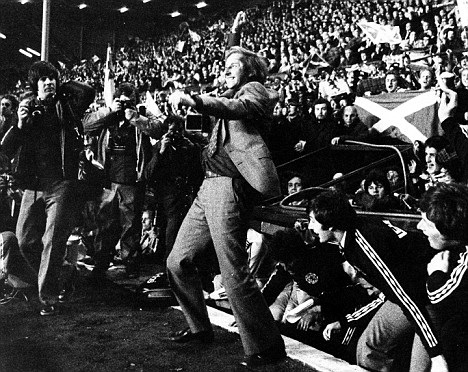
And so came the lead up to the finals. Scotland was gripped by World Cup fever. The natural enthusiasm, effervescence and unquenchable optimism of MacLeod swept the nation faster than a forest fire during an Australian heat wave. MacLeod himself seemed happy with the mood of the nation, stating his team would come back with, “at least a medal”. When asked what he would do after winning the World Cup, MacLeod quipped back, “Retain it”.
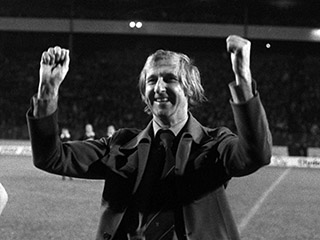
Logic went out the window. The good form of the previous year had been replaced with form that could at best be described as unconvincing. The British International Championship was not retained with draws against Northern Ireland and Wales followed by a defeat to a Steve Coppell goal at Hampden for England. Danny McGrain, as intelligent, elegant, composed and talented a right back as any then on the planet, was out due to a long term injury. Finals opponents went unwatched which MacLeod`s son, Andy, states was due to unwillingness of the SFA to fund scouting trips. VHS video tapes had to do. The previous summer’s tour had been no disgrace but neither was it overwhelming. Even the bigger picture didn’t look good; no European side had ever won a World Cup in the Americas (a status that still remains). Regardless, 25,000 overjoyed fans packed into Hampden Park to watch the players driven around waving in an open top bus as the antithesis of a low key send off. Setting forth to the Southern hemisphere with MacLeod among the Scottish delegation was the President of the SFA, Queen of the South Chairman Willie Harkness.
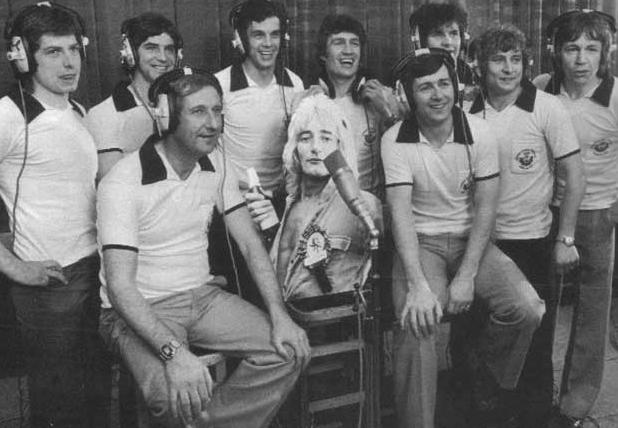
The Scots first opponents were Peru. The expectation in Scotland, remarkably, bearing in mind the opposition three seasons before had won the South American championship, was a comfortable Scottish victory. Jordan put the Scots ahead in the 14th minute when Ramon Quiroga was unable to hold a Masson shot. The Peruvians, though, pushed back into the game with their impressive speed and skill causing big problems. The equaliser by Cueto just before half time was nothing less than merited.
An hour into the game a challenge on Bruce Rioch led to a penalty for the Scots. Up stepped Masson, the man who had scored with a penalty in Argentina the previous summer and in the furnace of a qualifier at Anfield. As he had done against Wales, he hit the ball to the keeper’s right. This time though the ball was hit too close to the goallie. At waist height, Quiroga snapped up the opportunity to make amends for his earlier shortcoming and kept the score at 1-1. Things were to get worse for the Scots. Next to make his mark was Teófilo Cubillas, the player since voted 48th in the IFFHS poll of the greatest players of the 20th century and the highest scoring midfielder in the history of the World Cup Finals. Cubillas lashed in two rocket drives in the space of five minutes to kill the game for the Peruvians.
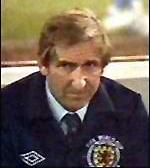
Looked at objectively, a defeat against such a capable side, played in a far and distant land would be seen as no disgrace. Measured against the bench mark of preceding hyper-expectation, the result in Scotland was viewed as a national disaster. It was to get worse still. Kenny Dalglish and Archie Gemmill were selected to provide a urine sample for the doping control. Gemmill said he was dehydrated and unable to provide a sample. Willie Johnston instead went to give the sample and thought nothing else of it.
When Johnston was later in his room at the Scottish base, he was surprised when MacLeod knocked on his door and asked him to a attend meeting with the team doctor. Walking into a room with a serious atmosphere, the unassuming Johnston was to have Luque’s prophecy fulfilled in a manner that would have had Nostradamus exploding with jealousy:-
"Did you take pills before the game?" asked the doc.
"Yes," answered the puzzled Johnston.
"Reactivan?" asked the doc.
"Yes," Johnston replied still confused.
"Didn`t you know that Reactivan contains a banned stimulant? Your drug test was found to be positive. You`re in big trouble, Willie."
“You`re being sent home. You`ll never play for Scotland again," said SFA Secretary Ernie Walker.
Next opponents were the team perceived as the group underdogs, Asian qualifiers Iran. The Scots delivered an anaemic, impotent, insipid and idealess performance. The best Scotland could manage was forcing Iran into an own goal during a 1-1 draw.
And so to the final game. Peru were looking good, having followed up the Scots win with a 0-0 draw with Netherlands. Iran were duly despatched 4-1 allowing Peru to progress to a later game against Argentina (dodgier than an MP’s expense claim, the 6-0 Peru defeat has since continually been immersed in strong accusations of match fixing). This meant Scotland had to beat Netherlands by three clear goals to progress at the expense of the Dutch.
The 1974 World Cup runners up no longer had Johan Cruyff who elected to boycott the finals. A player of astonishing ball control made all the more remarkable for the pace at which he did it, Cruyff was a player that any side would miss. His team mates, though, were certainly no mugs. Penalty maestro, Rob Rensenbrink, turned the mountain the Scots needed to climb into one of Himalayan magnitude when he scored from the spot after 34 mins. The Scots fought back with a Dalglish equaliser just before half time. Archie Gemmill put the Scots in front immediately after the restart with a penalty to give a glimmer of hope. In the 68th minute came the goal that if by some chance there is anyone reading this who does not know what is being referred to, type the words “Archie Gemmill” into youtube.com and then press [enter].
The mountain was suddenly looking scalable and in Scotland fans dared to dream again. No need to bother. Johnny Rep went up the pitch three minutes after Gemmill’s moment of magic and launched a long distance screamer into the back of the net. Final score, 3-2 and home time for the Scots. The Dutch went on to a second successive final defeat against the World Cup host nation. Rensenbrink hit the post in the last minute of normal time but Argentina won in extra time 3-1.
In the backlash against the Scotland disappointment, MacLeod was a top target for the criticism as was Johnston. The failure of the 1979 referendum for a devolved Scottish parliament has been suggested in some quarters as having been impacted by the 1978 World Cup disappointment. As late as 1988, a full decade after Argentina, Johnston was telephoned by a journalist aggressively asking during the Seoul Olympics drug scandal if he was related to Jamaican born Canadian, Ben Johnson. As for MacLeod, an otherwise capable and endearing football manager, two weeks in Argentina were cast to be the enduring perception for almost everyone. His mark was left, though, as a string of Scotland managers afterwards urged caution in their desire to avoid reaping the whirlwind from a harvest of uncontrolled expectation.
MacLeod was in charge for one more game as Scotland Manager, a 3-2 defeat in the Euro qualifiers away to Austria. Willie Harkness remained President of the SFA and attended a second World Cup in this role, the 1982 contest in Spain. MacLeod returned to club management and it was in this capacity that the two became colleagues again. MacLeod became manager of Queen of the South in 1991 for a year. Jimmy Robertson said the following of MacLeod when interviewed in 2009:-
“He got the job and we didn’t have enough players. We’d enough for the Saturday but we were running a reserve team, so we didn’t have enough. So we’d have reserve games up around the Glasgow area. We were playing flipping Rangers and Morton and playing everybody. We played St Mirren and we’d only 10 players, Ally played himself, at 61. They were beating us 7-0; We got a penalty and he took the penalty and scored, 7-1. It was unbelievable, but Ally was. He would blether away about Scotland. He let you go out and play, there was no tactics involved. He’d say, ‘You’re Willie Miller: You’re Alex McLeish: You’re Doog Rougvie: You’re John Robertson:’ that kind of thing.”
Ally MacLeod passed away on 1st February 2004 after a long fight against Alzheimer’s. He was 72. A man again regarded with affection in the years since Argentina faded into the memory, tributes poured in from everywhere remembering a man of boundless warmth and enthusiasm:-
Kenny Dalglish – "Ally was a real larger than life character. He was somebody who brought a great deal of humour into whatever company he was in. The game nowadays could certainly do with more characters of his kind"
Joe Jordan - "He was always the optimist. That’s what I would remember of him. He loved his football. He was a person that never really changed - he was the same. He only did a little bit during the World Cup in Argentina, when we were all under pressure.”
Perhaps the most appropriate tribute was one that arrived in the Summer before his death. At Hampden Park a delegation of Tartan Army representatives presented a crystal decanter to Ally MacLeod in recognition of his contribution to Scottish football.
Related articles:-
Wales v Scotland - Alexander Jones
World Cup Doonhamers
Dougie McBain and the 1948 Olympics
`Sons of Scotland` - players from the Scotland squad that made it to the 2006 under 19s European Championship final to have since played for Queen of the South